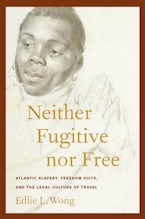Neither Fugitive nor Free
Atlantic Slavery, Freedom Suits, and the Legal Culture of Travel
Part of the American Literatures Initiative Series
Neither Fugitive nor Free draws on the freedom suit as recorded in the press and court documents to offer a critically and historically engaged understanding of the freedom celebrated in the literary and cultural histories of transatlantic abolitionism. Freedom suits involved those enslaved valets, nurses, and maids who accompanied slaveholders onto free soil. Once brought into a free jurisdiction, these attendants became informally free, even if they were taken back to a slave jurisdiction—at least according to abolitionists and the enslaved themselves. In order to secure their freedom formally, slave attendants or others on their behalf had to bring suit in a court of law.
Edlie Wong critically recuperates these cases in an effort to reexamine and redefine the legal construction of freedom, will, and consent. This study places such historically central anti-slavery figures as Frederick Douglass, Olaudah Equiano, and William Lloyd Garrison alongside such lesser-known slave plaintiffs as Lucy Ann Delaney, Grace, Catharine Linda, Med, and Harriet Robinson Scott. Situated at the confluence of literary criticism, feminism, and legal history, Neither Fugitive nor Free presents the freedom suit as a "new" genre to African American and American literary studies.
Contributor Bios
Reviews
"Expands the contours of African American writing and identity through meticulous reconstruction of eighteenth-and-nineteenth-century freedom suits." ~ American Quarterly
"In addition to providing a strong sense of the focal cases, Wong evinces a rare willingness to consider the ways these cases were reappropriated in larger antebellum legal processes and print culture. Wongs wonderfully relentless interdisciplinarity pushes her repeatedly to analyze not simply events, but the language and rhetoric surrounding them. Her command of published sources is impressive: she deftly weaves together scholarship on law, legal history, literary criticism, political history, social history, gender theory, and ethnic studies, and she rightly insists that her subjects cannot be fully understood without recovering a richer range of voices and texts. Perhaps most importantly, Wongs book joins calls to reconsider generic definitions of slave narratives and race literature and so begins to embody the potential for broader senses of black texts and black history." ~ Journal of American History
"A hidden face of abolitionism is revealed in Edlie L. Wong's, Fugitive nor Free, which examines freedom suits brought by black people or for them, mostly as a result of avisit to a free zone in which law was silent on slavery or in which law barred slavery." ~ Early American Literature
"Neither Fugitive nor Free's interdiciplinary and transatlantic approach usefully draws from literary criticism, critical race theory, legal history, and gender studies to provide sophisticated and revealing insights into Anglo-American understandings of and narratives about freedom and slavery." ~ Brian Schoen, Common-Place
"An original, powerful interdisciplinary approach to the political and legal struggles against slavery in the antebellum period. Wong’s transatlantic focus on the travel of enslaved persons, as fugitives or nominally free, goes far beyond well known slave narratives and gets to the heart of the contradictions of slavery in a liberal republic." ~ Amy Kaplan,author of The Anarchy of Empire in the Making of U.S. Culture
 This work is licensed under a
Creative Commons Attribution-NonCommercial-ShareAlike 4.0 International License
(CC BY-NC-SA).
This work is licensed under a
Creative Commons Attribution-NonCommercial-ShareAlike 4.0 International License
(CC BY-NC-SA).


